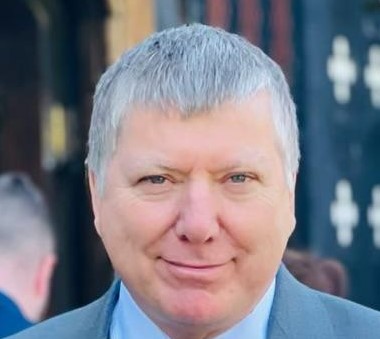Lucy Stevens - 29th February 2024
Meet EFS Fostering Ambassador, Philip as he talks us through his journey into the world of fostering.
“Becoming a trusted person in a child’s life and helping them tackle major issues is what drives me as a foster carer”.
Eastern Fostering Services foster carer and ambassador, Philip, started fostering 3 years ago and was inspired to do so through his experiences helping refugees.

“I first enquired about fostering in September of 2020. I had seen a news article saying that Kent County Council was declaring that it could no longer safely house asylum seeking children and was appealing for other local authorities to help. I had spent many weeks in the makeshift refugee camp known as The Jungle in Calais and this had led to me working with asylum seekers and refugees, so I felt I could potentially help these young people. I knew two staff members from Eastern Fostering Services who had been to Calais with me, so I contacted them.”
Philip applied to foster during the Covid pandemic. Whilst his experience of the fostering assessment differed from the norm, he felt it was a positive experience.
“I was unsure initially whether my application as a single male foster carer would be acceptable. I was quickly assured that this would not be a problem. The assessment was very thorough – I had difficulty remembering all the addresses where I had lived for the previous 35 years. Also, a number of my previous employers no longer existed. As it was during Covid, much of the process had to take place over Zoom. I felt Eastern Fostering Services took this in their stride, were creative and supported me in the process. My grown-up children were interviewed, and it was a relief they were happy with my parenting skills! I found it interesting that my sister had a slightly different perspective on our teenage years when she was interviewed, but fortunately nothing particularly alarming. I suppose the process whilst thorough, does allow you to reflect upon your life, your experiences, who you are and what motivates you – there’s a lot of value in that.
Everyone reassured me that the fostering panel would be a positive experience. If an assessment is carried out well, all difficult questions should have been asked and responded to in the report so there should be no nasty surprises. I was a little nervous, and due to Covid the panel was over a video call which was a little intimidating. It was a very positive experience, I felt I had been prepared and the panel members did of course ask questions but were very supportive and they made me feel welcomed into the fostering community.”
Only a week after his approval, Philip welcomed a 15-year-old young person, we’ll call him A, from Afghanistan. A spoke no English and arrived with very few belongings. Philip had assumed that most children in foster care were only fostered for short periods, but A was with Philip for 2 and a half years.
“He barely spoke any English, but made it clear within a day or two that my cooking was not acceptable! From that day on, he cooked all his meals himself, and a pretty good chef he was too. Due to covid he was not able to start school for several months which meant we were at home together. We settled into a standard parent/teenager routine fairly quickly. In the early days, he would spend most of his time in his room, talking online to friends and we would communicate (mostly via google translate) when he needed something. One of the highlights of his time with me was his integration into the local cricket club. I took him to one of their practice sessions and he instantly made an impact, and over the two seasons he played for them he became one of their main fast bowlers. He also tried to knock the ball out the ground whenever he was batting – I suspect he scored more 6s than singles across all his innings. After two and a half years his English had improved, and he was going to college by bus. Unfortunately, from where I live the bus service is poor, and all the friends he had made were in the town he went to college in, so when his social worker offered him a place in a house there, he was keen to move on. But we kept on seeing him regularly, and due to reaching 18 and having to move out of the house, he has ended up temporarily back with us.”
Philip also cared for a 14-year-old boy, who we’ll refer to as B.
“B had problems at school and so unexpectedly he ended up being schooled remotely. This meant he did not get out much and this made the time with us more intense. Sometimes as a foster carer, you do have times when children are out of school for one reason or another and it can add pressure to the home. That’s why good support from your fostering agency is so important. Fortunately, B was able to go home to his family after a couple of months, which we felt was a good thing for him.
While B was still with us, we took in another child, ‘C’, this time aged 14 from Iran. One interesting thing we found out was that he was a keen domino player, and this helped to break down some language barriers with B. We also got them both to play Uno, a simple card game that doesn’t need language. When A returned recently, although he doesn’t speak any of the Iranian languages of C, they managed to communicate effectively, and clearly shared a common background and they seem to get on well.
We have also had a younger child, aged 12, come for a couple of weekends to give their carer some time off. There is a significant difference in approach needed for someone who needs more attention and supervision. Whilst it may suit some, it is likely that in future we will stick with older teenagers as I personally find I’m able to more easily meet their needs, and contrary to popular belief, find them very rewarding to care for.”
It’s true that fostering is a journey and that you learn a lot about yourself on the way. We encourage prospective foster carers to keep an open mind about what type of child or young person they may want to foster, over time you learn where your skills lie and what you find most rewarding.
“One of the things that I’ve been struck by through fostering is how inequality has such an impact on people’s lives. Being able to provide a safe space for vulnerable children is to be able to offer a period of calm in troubled times. But there is more to it than meets the eye. As a foster carer, you need to complete reports and do training. You are a professional and need to invest in your development.”
Eastern Fostering Services offer a variety of training to our carers and support them to develop new skills and knowledge and we encourage carers to share this with each other in support groups and forums.
“From the phone call on the first weekend of having A move in with us, EFS have been constantly available for any issue, big or small. Their guidance has been invaluable.”
When asked what he thinks is the most important quality for a foster carer to have, Philip says that empathy is key.
“To be able to take a holistic view of a child and their needs is so important. Sometimes just thinking ‘what would I think if I was in their shoes?’ is so powerful and can have such an impact on a young person.”
If you’re considering fostering, it’s always an idea to talk to someone who knows what it’s like. If you’d be interested in talking to Philip or one of our other ambassadors, we’ll happily put you in touch. You can email us at team@easternfosteringservices.com or call us on 01206 299775. You can also message us on Facebook
As Philip says, “If you want to foster, talk it through with others, but don’t let anyone say you can’t do it. IF I can, you can!”






